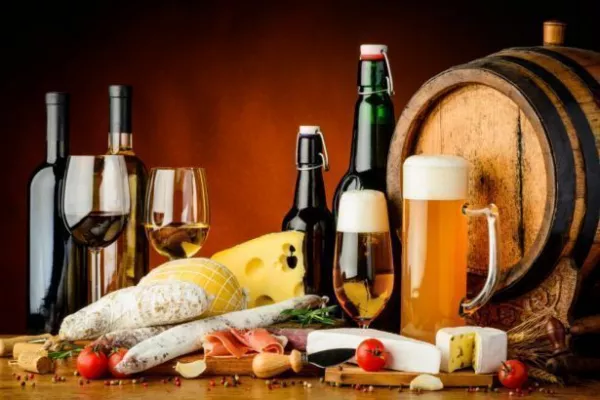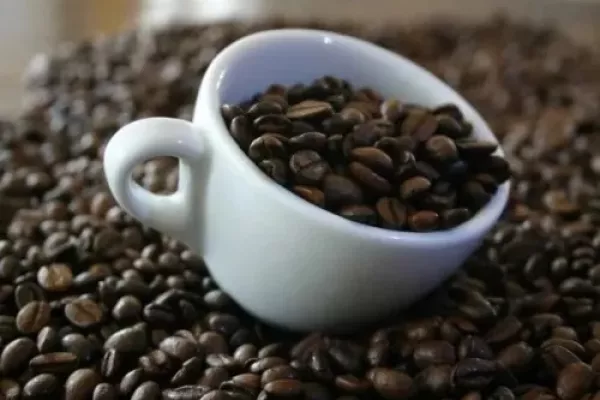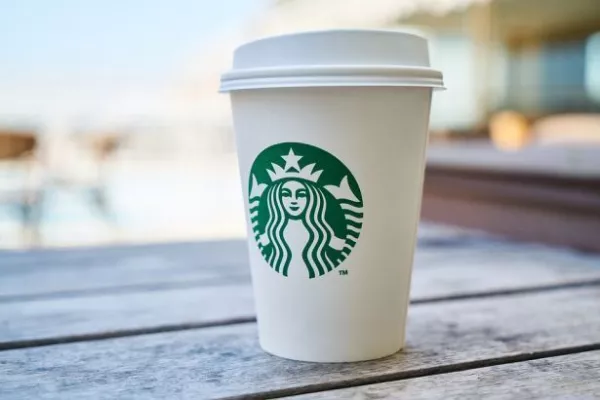Hospitality Ireland presents a round-up of global drinks, pub and food news.
Irn-Bru Owner's Annual Profit To Exceed Pre-Pandemic Levels
A.G. Barr expects annual profit to exceed pre-pandemic levels and beat current market expectations, with "on the go" and hospitality sectors remaining particularly strong, the Scotland-based soft drinks maker said on Monday November 29.
The company, best known for fizzy drink Irn-Bru, forecast both annual revenue and pretax profit ahead of current market expectations, despite ongoing near-term operating cost pressures.
Irn-Bru was in the spotlight earlier this month when Scotland's First Minister Nicola Sturgeon handed U.S. Representative Alexandria Ocasio-Cortez a can of the orange fizzy beverage at COP26 in Glasgow, with Ocasio-Cortez giving the cherished Scottish drink a thumbs-up.
A.G. Barr expects full-year revenue of about 264 million pounds ($351.73 million) and profit before tax of around 41 million pounds for the 12 months ending January 2022, compared with 26 million pounds last year.
The company, which has seen a revival in demand since COVID-19 curbs were relaxed earlier in the year, said the fast-moving pandemic situation remains a risk but it still expects its revenue momentum to continue into 2022.
The emergence of a new variant of coronavirus late last week has raised questions of increased curbs ahead of Christmas, with Britain announcing some new measures to try and slow the spread.
UK Pub Operator Marston's Hopeful Strong Christmas Bookings Will Help It Turn Corner
British pub operator Marston's said Christmas bookings were "encouraging" and trading was now exceeding pre-pandemic levels, as it hopes to turn the corner after reporting a much bigger annual loss than last year on Tuesday November 30.
"We believe the worst of the pandemic is now behind us, albeit we will have to navigate through the coming winter months if any further government restrictions are put in place," Marston's, which has about 1,500 pubs in the UK, said.
The UK has in the past week seen cases of the new Omicrom variant of the coronavirus, prompting the government to reimpose some restrictions to curb the spread of the virus.
Restrictions on hospitality earlier in the financial year due to the pandemic pushed Marston's to an underlying pre-tax loss of £100 million for the 12 months ended Oct. 2, widening from a loss of £22 million a year earlier.
But on a reported basis, it made a profit of 119.3 million pounds, helped by a 291 million pound gain on the sale of its beer business to Carlsberg UK.
That compared to a loss of £397.1 million last year.
Shares in Marston's, which have fallen around 6% this year, were flat by 0814 GMT on Tuesday November 30.
Marston's, brewer of Pedigree, Hobgoblin and Lancaster Bomber beer, said its business has been improving since COVID-related curbs were relaxed in April.
Like the hospitality industry across the world, pub operators were among the worst hit by the pandemic in Britain, with months of lockdowns or other restrictions on dining forcing them to cut jobs or raise funds to get through the crisis.
Marston's said it has decided not to propose a dividend for fiscal 2021, due in part to the potential for continuing uncertainty.
Addressing a widespread labour crunch and supply chain issues, Marston's said its exposure to the worker shortage was limited due to its predominantly suburban pub estate, while adding it was working with suppliers after seeing "some small pockets of disruption" relating to supply.
Last week rival Mitchells & Butlers said its sales in recent weeks have been higher than before the pandemic but sounded an alarm about challenges ahead due to rising costs for staff and utilities.
New Lockdowns Due To Omicron Would Threaten Coffee Industry - Colombia Coffee Chief
New economic lockdowns in response to the Omicron coronavirus variant would be another shock for the global coffee industry, Roberto Velez, head of Colombia's national coffee federation (FNC), said on Tuesday November 30.
Omicron was first discovered in southern Africa and has been labelled a variant of concern by the World Health Organization (WHO), prompting some countries to close their borders to foreigners in recent days or impose other restrictions.
"Once again the fear is that countries shut down and we return to a world where coffee is only consumed at home," Velez told Reuters in an interview.
As well as depressing demand, the pandemic has already led to a sharp rise in the cost of transporting beans to major consuming countries in North America and Europe as a surge in demand for consumer goods and not enough ships as people stayed home due to the pandemic caused bottlenecks.
Colombia's output of coffee has fallen in 2021 due to strong rains. However, the country has now caught up with coffee shipments after up to one million 60-kilogram bags were delayed amid social unrest and widespread protests from late April to mid-June, Velez said.
"We're about to enter December and all shipments are up to date, as are all payments to exporters," Velez said at his office in the north of Colombia's capital Bogota, hours before the start of the National Coffee Growers Congress.
The South American country is currently in the grips of a heavy rainy season which has delayed flowering of coffee plants, which also happened during the first half of the year, cutting harvest levels in 2021 to between 13 million and 13.5 million bags.
Colombia's coffee output hit 13.9 million bags in 2020, down 6% from the 14.8 million bags in 2019, when production saw the highest levels in 27 years.
"Between 13 million and 13.5 million (bags), that's what I think is going to close the 2021 calendar year, which is far below the average of 14.1 million to 14.2 million bags at the close of the last six years, we're talking almost a million bags less," Velez said.
Exports are likely to be between 12 million and 12.5 million bags, he said, close to last year's 12.5 million.
Zero-Sugar Oreos See Weak China Response Despite Healthy Snacking Trend
Initial reaction from the launch of Oreo Zero sugar-free cookies in China has been disappointing, Mondelez International Inc's CEO said, underscoring some of the challenges facing the global snack giant as it makes a big push in the market.
Mondelez launched Oreo Zero in China in August, taking a cue from social media trends showing reduced-sugar and sugar-free diets as a key trend, and the limited availability of zero-sugar biscuits in the country.
"The reaction of the consumer has been a little bit disappointing ... for one reason or the other, the consumers feel it is not the real thing," Chairman and Chief Executive Officer Dirk Van de Put told Reuters.
"This indicates the dilemma," he said. "We can offer the products to the consumer, but it's not given that the consumer will buy and eat them."
Mondelez, which also makes Ritz crackers, belVita biscuits, Cadbury chocolates and Trident gum, has set a target to grow Oreo sales by $1 billion by the end of 2023. The brand surpassed $3 billion in global sales in 2019.
Oreo Zero cookies contain maltitol instead of traditional sugars like sucrose and glucose, and the tweak gives a very slight difference in taste that only heavy consumers of regular Oreos would be able to identify, according to the company.
The lukewarm consumer response underscores a challenge for global snack firms with a well-known brand and product. Mondelez varies the amount of sugar it includes in Oreos in different markets around the world. In China, Oreos have less sugar than do Oreos in the United States, which could make for an easier transition to no-sugar cookies.
Chinese consumers, however, remain cautious about packaged foods' no-sugar claims, said Michael Norris, research and strategy manager at Shanghai-based consultancy AgencyChina.
For example, sugar-free drinks commanded only 1.25% of China's soft drinks market in 2019, according to a June Dongxing Securities report, though Genki Forest's sugar-free fizzy drinks and Suntory's Oolong tea are gaining popularity.
Despite weak initial demand, Van de Put said Mondelez will continue to sell Oreo Zero in China, comparing it to Diet Coke, a sugar-free soda which he said also received muted consumer response at first, but has now become one of Coca-Cola's top selling product globally.
"The consumer's mind is very difficult to identify in this area," he said.
Chicago, Illinois-based Mondelez, in an emailed statement, declined to say whether it would sell Oreo Zero globally. Its biscuit sales in China rose by mid-single digits during the third quarter, with Oreos being the "standout performer," Luca Zaramella, Mondelez's chief financial officer said on a November conference call.
Mondelez does not disclose sales figures for the new Oreo product.
"Winning in India and China is absolutely critical," said Van de Put, who became CEO in 2017. Both countries have high rates of diabetes.
Van de Put also told Reuters that he expects Mondelez's business in Asia, the Middle East and Africa (AMEA) to overtake North America as its second-biggest market within five years. Of Mondelez's $26.5 billion total revenue in 2020, AMEA accounted for 22%, North America 31%, while Europe accounted for 38%, its annual report showed.
News by Reuters, edited by Hospitality Ireland. Click subscribe to sign up for the Hospitality Ireland print edition.









